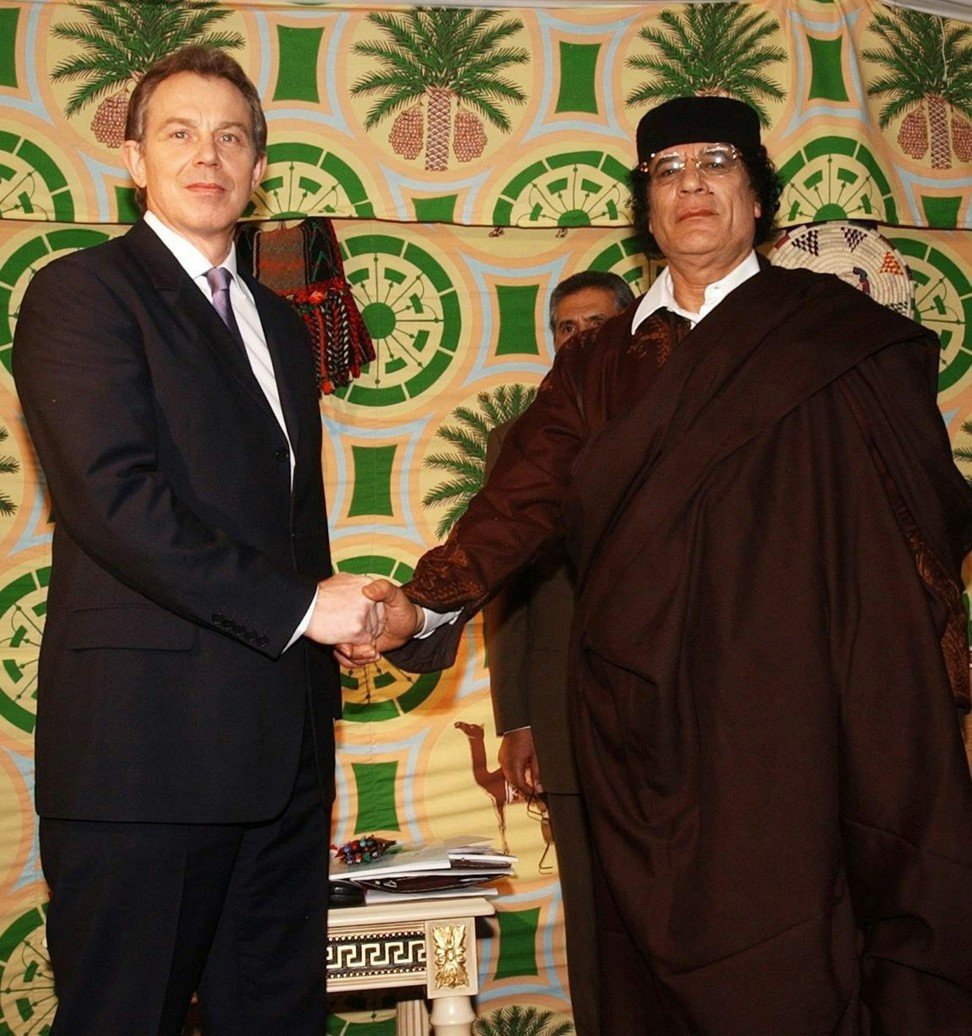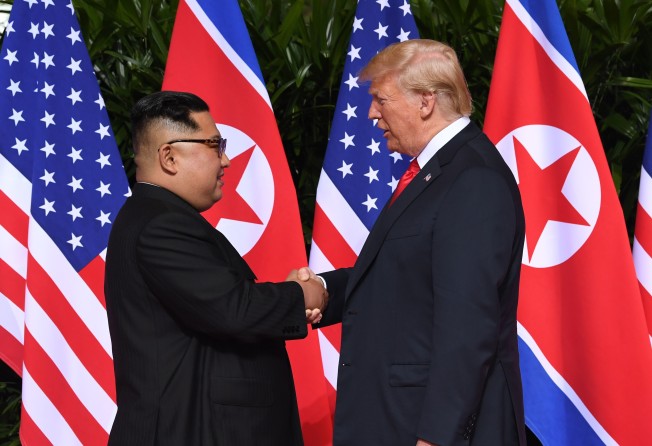
Why Trump-Kim handshake is no symbol of peace, but fuel for North Korea’s brutal regime
Sherif A. Elgebeily says history teaches that the US president’s choice to pursue a peace deal under the media glare has little chance of success, and meeting Kim Jong-un with no preconditions can only confer legitimacy on the North Korean leader’s regime

There is good reason for moderation in the depiction of world leaders shaking hands for peace – they are seminal windows in time: think, for example, of US president Bill Clinton, Palestinian leader Yasser Arafat and Israeli Prime Minister Yitzhak Rabin at the White House, shaking hands upon agreeing on the Oslo Accords.
At times, too, they do not age well – photos of Muammar Gaddafi and Tony Blair, Augusto Pinochet and Margaret Thatcher, or Robert Mugabe and Queen Elizabeth can circulate on cue to support criticism about Britain’s choice of foreign partner.
Brutal dictators are always happy to be pictured next to world leaders for the same reasons that we should be restrained in granting their requests – such photos grant international legitimacy and consolidate domestic power and popularity. A responsible world leader will understand that a photo can be as much, if not more of, a boon than even the lifting of sanctions – it provides fuel for the engines of a regime. A photo is, in many ways, collateral.
In this vein, the photo of US President Donald Trump and North Korean leader Kim Jong-un that is being hailed as evidence of a Trump “win” is likely to be the very propaganda that will be used in North Korea to show that it and the United States are on a par.
In negotiating peace, recognition and granting of legitimacy is an incredibly important step on the path to success; a government can show the seriousness of its intentions to peace by recognising another state or group. In many cases, this is a large part of what a pariah state wants – acknowledgement, recognition, to be taken seriously. Recognition is leverage and should be respected as one of numerous tools at the disposal of those pursuing diplomacy.

For this reason, it is imperative that this should come within a wider framework of enforceable concessions, often at a mid-to-late stage in talks, and with the weaker of the two parties offering more than its counterpart.
It is unsurprising, then, that much of the pre-talk in peace processes usually takes place without the knowledge of the general public. Not least, the prospect of failure is less daunting away from media visibility; it also reduces instances of showboating or the need to save face, for once a line in the sand is drawn publicly, it is much more difficult to back down without appearing to “lose”.
In reality, negotiation is a process of give and take, where a pot of outlandish demands eventually simmers down to a more reasonable and palatable jus, the extreme elements having evaporated. To date, there are no examples of smooth transitions to peace that have played out entirely in the public eye – statistically, Trump’s decision to broker peace with perhaps the most reclusive state in the world using this model appears to be a recipe for disaster.
Watch: The video Trump shared with Kim at the Singapore summit
When the time comes to meet face to face, typically, many of the steps towards peace have already been put in progress and are being independently verified in a scheduled, choreographed tango – one step by one government, another by the other. Where this falters, as it did between the US and North Korea in the 1990s, it is usually not through a failure of the text but rather the implementation. In these cases, the text is king and, most importantly, can be amended to reflect new realities where appropriate.
The failure of the 1994 Agreed Framework between the US and North Korea in 2003 was not due to North Korea’s departure from its stipulations but, rather, delays from the US in fulfilling its obligations and – finally – Pyongyang’s inclusion in 2002 in George W. Bush’s “axis of evil”. From a diplomatic perspective, it is incredible that the 1994 agreement or the content of the six-party talks between 2003 and 2009 did not form part of the foundations for the resumption of negotiations.
Watch: Trump and Kim make pledges on denuclearisation and security
Finally, today is a missed opportunity to bring North Korea’s domestic record up to an internationally agreed minimum standard. To meet Kim face to face without even the most basic of preconditions of, for example, improved democratisation or human rights pledges, concedes far too much at an early stage from the US president.
It also sends an extremely damaging message that, irrespective of a leader’s record on human rights and basic freedoms, and its savage maintenance of a dictatorship, recognition can come through posing a sufficient threat to the region and the wider world; such a high-level meeting is a reward that is difficult to justify at this early stage.
It is dismaying that, under the guise of peace, the Trump-Kim meeting has actually undermined the rules-based system where there are minimum standards for inclusion in the international community.
Dr Sherif A. Elgebeily is director of the Centre for the Study of International Peace and Security in London